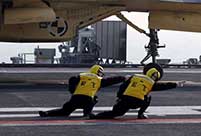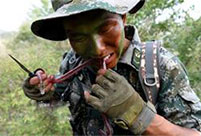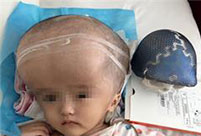

BEIJING - The Japanese government should have deep and profound reflections on the country's atrocities during World War II and explain why a Japanese company made an apology only to US prisoners of war (POWs).
On Sunday, Hikaru Kimura, a senior executive of Mitsubishi Materials apologized for wartime enslavement of some 900 US POWs at mines run by Mitsubishi Mining Co, the firm's predecessor, at a special ceremony in Los Angeles.
"Today we apologize remorsefully for the tragic events in our past," Kimura said. "We cannot help feeling a deep sense of ethical responsibility for this past tragedy."
However, Kimura's apology turned out to be incomplete and misleading in the eyes of the public of the Asian countries which had been invaded by Japan during WWII.
As a matter of fact, the number of victims from those countries, who were forced to do hard labor for Mitsubishi Mining and other Japanese firms seven decades ago, was far more than that of the US POWs.
Aside from the US POWs, the Japanese government also forced tens of thousand of Chinese and Koreans to fill the country's labor shortage during the war.
According to a report released by the Japanese government after the war, a total of 3,765 Chinese worked as forced labors at 12 mines of Mitsubishi Mining in Japan, and about 720 of them did not get through the hardship and died.
Although 70 years have passed since the end of WWII, the Chinese laborers never received any apology from Mitsubishi Materials.
Since 1997, Chinese survivors of forced labors and their relatives have filed lawsuits against the Japanese company in Tokyo and other Japanese cities, but all the cases were all rejected by Japanese courts.
Last February, a lawsuit was also filed in a Beijing court to seek compensation and apologies from Mitsubishi Materials and another Japanese company, which have not been positively responded so far.
Although Mitsubishi Mining provided a convincing example for Japan's enslavement of Chinese labors, it was only part of the country's wartime atrocities.
During the war, nearly 40,000 Chinese labors were forced to work in Japan by the Japanese military and businesses, and some 7,000 of them died in the country.
Ironically, Sunday's apology by Mitsubishi Materials was described by some Japanese media as a "new step toward post-war reconciliation" following Prime Minister Shinzo Abe's "deep remorse" on wartime history in US Congress in April.
While showing a humble face to the United States, Japan displayed its arrogance over Asian neighbors, especially China and South Korea that suffered the most from Japan's wartime atrocities.
In fact, Abe also failed during his speech to US Congress to mention Japan's aggression and colonial rule and to express his apology for the country's wartime brutalities.
As the whole world marks the 70th anniversary of the end of WWII this year, Japan should take it as an opportunity to deeply reflect on its wartime history, so as to clear up doubts and concerns from its neighbors and truly realize peaceful coexistence in the future.
 |
 Soldiers serving at Liaoning aircraft carrier
Soldiers serving at Liaoning aircraft carrier Bikini beauties lifeguards in river rafting place
Bikini beauties lifeguards in river rafting place PLA soldiers eat raw snake meat in harsh training
PLA soldiers eat raw snake meat in harsh training Doctors use 3D-printed skull to save girl
Doctors use 3D-printed skull to save girl Kiss contest held in Nanning, SW China
Kiss contest held in Nanning, SW China Yunnan-Myanmar Road: The past and present
Yunnan-Myanmar Road: The past and present Campus belle of Xiamen University gets popular online
Campus belle of Xiamen University gets popular online Who says moms cannot be trendy and hot?
Who says moms cannot be trendy and hot? Eight fruits that defend men's health
Eight fruits that defend men's health  Ling’s fall caused by wild ambition, desire
Ling’s fall caused by wild ambition, desire 6 rare then-and-now photos of WWII China
6 rare then-and-now photos of WWII China Show of force: 7 military off-road vehicle monsters
Show of force: 7 military off-road vehicle monsters Clique bait: The systematic takedown of Ling Jihua’s circle
Clique bait: The systematic takedown of Ling Jihua’s circleDay|Week